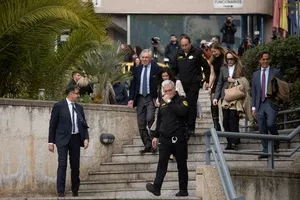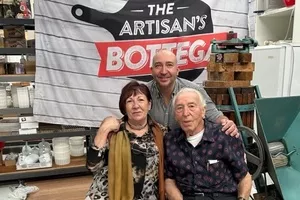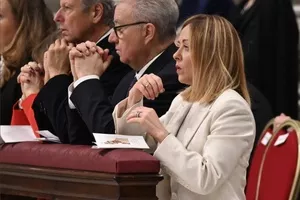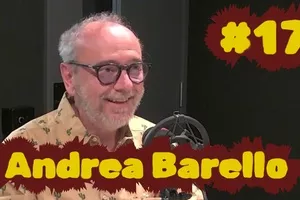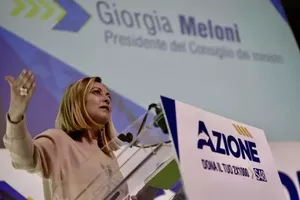Houses with two floors or an underground garage were things of wonder to him, the stuff of impossible dreams.
Little did young Corallo know that a few decades later, these foreign aspects would become part of his daily life, and that he would become responsible for their design and implementation.
The Italo-Australian, born in Melbourne, has always had a passion for architecture.
His parents met in 1948, in the African city of Asmara, and married the following year.
His father was born in Ragusa (Sicily) and his mother in Padua (Veneto), although she grew up in the Tuscan town of Prato.
“After the war, they weren’t able to return to Italy because the country was in ruins,” Corallo says.
“Even the situation in Africa was tenuous, due to the British presence.
“My father already had two brothers living in Australia, so after 16 years, they decided to migrate here.”
Carlo has an older sister, Carmela, who was born in Asmara, while he was born some years later in Melbourne.
His parents found a home in Carlton, but soon made a permanent move to Richmond.
“When we were living in Carlton, there were three families who shared two rooms,” he recalls.
“I don’t know how they did it.”
As a child, Corallo would imagine how he could improve houses and, as an adult, what his dream home would look like.
“On weekends, we would help my father maintain the house,” he says.
“That’s where my passion for design and construction began, and I realised I wanted to become an architect.”

Corallo’s family in Melbourne. Left to right: his mother, Mafalda, older sister, Carmela, his father, Giovanni and Corallo himself (centre). His uncle, Umberto, and aunt, Maria, stand behind
Once he finished high school, Corallo went to great lengths to be admitted to the University of Melbourne’s Faculty of Architecture.
He recalls the enormous satisfaction of being enrolled, which was soon replaced by the shock of how demanding his classes were.
“They’re not subjects you can prepare for by studying endless books or memorising concepts by heart,” he explains.
“You need a lot of ingenuity.
“I would often spend days and days trying to draw something; then it wouldn’t match my professor’s expectations, and I would have to start all over again.”
Regardless of his workload, Corallo enjoyed his time at university, where he had the opportunity to meet numerous other second-generation Italians and Italo-Australians.
He also attended an Italian club, run by his cousin, Massimo Petterlin, through which he met many people in the community.
After completing his studies in the early 1980s, Corallo found it difficult to find a job.
“It was actually my sister who encouraged me to go to the studios in person,” he says.
“This allowed me to find a temporary job that was supposed to last a few weeks, but I ended up working there for almost five years.
“I was one of the youngest and the lowest paid in the office.
“Even if the workplace culture wasn’t optimal, it’s where I got my start.
“The company sent me to Hong Kong for 18 months in 1981; it was my first big trip outside Australia.”
Corallo then took a short break from working, due to the arrival of his paternal aunt and uncle.
In 1985, he met an old colleague who invited him to visit his company.
This was the beginning of a long and fruitful collaboration between Corallo and Peter Brook who, in addition to being a colleague and business partner, has also been a friend for over 40 years.
The two soon took over the shares of the company they worked for, Peddle Thorp, taking it from strength to strength over the years.
On June 2, while Italians around the globe celebrated the Republic Day, Consul Hanna Pappalardo awarded Corallo the title of Knight of the Order of the Star of Italy, recognising his tireless commitment to his work.
“Two and a half years ago I decided to retire because I believe it’s important to give young people the opportunity to enter the sector,” Corallo explains.
“There are so many enthusiastic people out there who are itching to do more.
“I’ve always thought that this is the right thing to do; otherwise, the companies risk dying.”
Despite his retirement, Corallo continues to be professionally involved with his daughters’ projects.
Giuliana and Valeria have followed in their father’s footsteps and embraced the field of architecture.
Corallo’s success has never limited his appreciation and involvement with Italian culture.
“My parents, regardless of their financial situation, never let my sister and me miss our private Italian or music lessons,” he says.
“Their aim was not to supercharge our education but to give us a broader view of our global culture through art, music and literature.
“Teaching their children Italian was their way of keeping us close to the Bel Paese.”

A very young Corallo with his father, Giovanni
In 1997, when his father passed away, Corallo and his sister felt compelled to do something to honour their bond with Italy.
Together with Tony Pagone, Max Petterlin, Pippo Cannata and Mr and Mrs La Rosa, the two founded the Sicilian Association of Australia.
Created in 2010, the association welcomes all those who have an interest in keeping Sicilian ties and traditions alive.
“Our aspiration is to become the link between the past and the future,” Corallo – who is currently the association’s president – explains.
“We help the clubs to continue with their activities because they have so many stories and important resources.
“All the success I’ve enjoyed in my life, including the title of Knight of the Order of the Star of Italy, are not solely my own.
“I’ve always been helped by other people, such as my friends in the association, and they have shared these feats with me.
“Even with my work, I would never have achieved it all without my wife, my sister and my parents.
“When someone is successful in life, it’s always thanks to a collective effort, as talent alone isn’t enough.
“I therefore want to extend my gratitude to my nearest and dearest.”



















